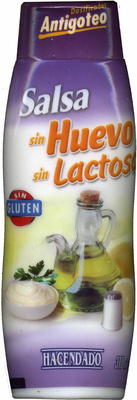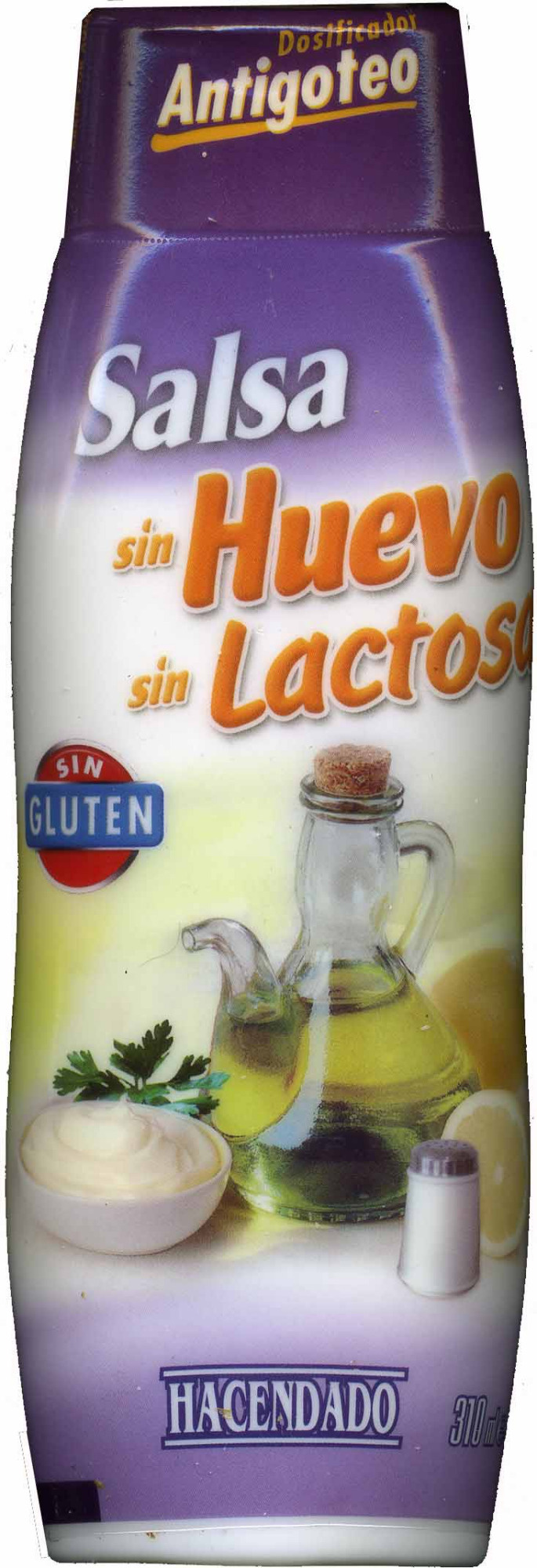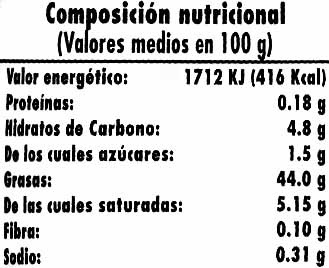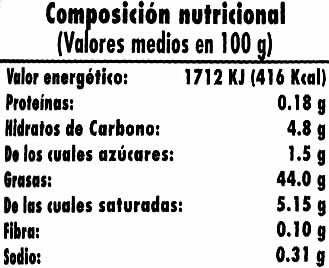Ajuda'ns a fer que la transparència alimentària sigui la norma!
Com a organització sense ànim de lucre, depenem de les vostres donacions per continuar informant els consumidors de tot el món sobre tot allò què mengen.
La revolució alimentària comença amb tu!
Mayonesa sin huevo ';Hacendado'; - DESCATALOGADO - 310 ml
Mayonesa sin huevo ';Hacendado'; - DESCATALOGADO - 310 ml
Aquesta pàgina del producte no està completa. Podeu ajudar a completar-la editant-la i afegint-hi més dades a partir de les fotos ja disponibles, o fent-ne més amb l'aplicació de androide o iPhone / iPad. Gràcies!
×
Codi de barres: 8480000170699 (EAN / EAN-13)
Nom comú: Mayonesa sin huevo
Quantitat: 310 ml
Empaquetament: es:Bote de plástico
Marques: Hacendado
Categories: Condiments, Salses, en:Vegetarian sauces, Maioneses, en:Vegan sauces, en:Egg-free mayonnaises, en:groceries
Etiquetes, certificacions, premis: Lliure de gluten, Vegetarià, Vegà, Sense lactosa
Llocs de fabricació o processament: Córdoba, Córdoba (provincia), Andalucía, España
Codi de traçabilitat: ES 26-00034-CO-C CE, FABRICANTE-Y-ENVASADOR, MORENO-S-A
Botigues: Mercadona
Països on es va vendre: Espanya
Matching with your preferences
Salut
Ingredients
-
22 ingredients
: Agua, aceite vegetal (44%), vinagre, almidón modificado de maíz, azúcar, sal (0,8%), mostaza, espesante: goma xantana (E-415), jugo de limón (0,1%), aromas, conservador: ácido sórbico (E-200), colorante: betacaroteno (E-160a) y antioxidante: ácido etilendiaminotetraacético (EDTA) (E-385).Al·lèrgens: en:Mustard
Processament d'aliments
-
Aliments ultra processats
Elements que indiquen que el producte està al grup 4 - Aliments i begudes ultraprocessats:
- Additiu: E14XX - Midó modificat
- Additiu: E160a - Carotè
- Additiu: E415 - Goma de xantè
- Ingredient: Color
- Ingredient: Aromes
- Ingredient: Espessidor
Els productes alimentaris es classifiquen en 4 grups segons el seu grau de processament:
- Aliments no processats o mínimament processats
- Ingredients culinaris processats
- Aliments processats
- Aliments ultra processats
La determinació del grup es fa en funció de la categoria del producte i dels ingredients que conté.
Additius
-
E160a - Carotè
Carotene: The term carotene -also carotin, from the Latin carota, "carrot"- is used for many related unsaturated hydrocarbon substances having the formula C40Hx, which are synthesized by plants but in general cannot be made by animals -with the exception of some aphids and spider mites which acquired the synthesizing genes from fungi-. Carotenes are photosynthetic pigments important for photosynthesis. Carotenes contain no oxygen atoms. They absorb ultraviolet, violet, and blue light and scatter orange or red light, and -in low concentrations- yellow light. Carotenes are responsible for the orange colour of the carrot, for which this class of chemicals is named, and for the colours of many other fruits, vegetables and fungi -for example, sweet potatoes, chanterelle and orange cantaloupe melon-. Carotenes are also responsible for the orange -but not all of the yellow- colours in dry foliage. They also -in lower concentrations- impart the yellow coloration to milk-fat and butter. Omnivorous animal species which are relatively poor converters of coloured dietary carotenoids to colourless retinoids have yellowed-coloured body fat, as a result of the carotenoid retention from the vegetable portion of their diet. The typical yellow-coloured fat of humans and chickens is a result of fat storage of carotenes from their diets. Carotenes contribute to photosynthesis by transmitting the light energy they absorb to chlorophyll. They also protect plant tissues by helping to absorb the energy from singlet oxygen, an excited form of the oxygen molecule O2 which is formed during photosynthesis. β-Carotene is composed of two retinyl groups, and is broken down in the mucosa of the human small intestine by β-carotene 15‚15'-monooxygenase to retinal, a form of vitamin A. β-Carotene can be stored in the liver and body fat and converted to retinal as needed, thus making it a form of vitamin A for humans and some other mammals. The carotenes α-carotene and γ-carotene, due to their single retinyl group -β-ionone ring-, also have some vitamin A activity -though less than β-carotene-, as does the xanthophyll carotenoid β-cryptoxanthin. All other carotenoids, including lycopene, have no beta-ring and thus no vitamin A activity -although they may have antioxidant activity and thus biological activity in other ways-. Animal species differ greatly in their ability to convert retinyl -beta-ionone- containing carotenoids to retinals. Carnivores in general are poor converters of dietary ionone-containing carotenoids. Pure carnivores such as ferrets lack β-carotene 15‚15'-monooxygenase and cannot convert any carotenoids to retinals at all -resulting in carotenes not being a form of vitamin A for this species-; while cats can convert a trace of β-carotene to retinol, although the amount is totally insufficient for meeting their daily retinol needs.Origen: Wikipedia (Anglès)
-
E160ai
Beta-Carotene: β-Carotene is an organic, strongly colored red-orange pigment abundant in plants and fruits. It is a member of the carotenes, which are terpenoids -isoprenoids-, synthesized biochemically from eight isoprene units and thus having 40 carbons. Among the carotenes, β-carotene is distinguished by having beta-rings at both ends of the molecule. β-Carotene is biosynthesized from geranylgeranyl pyrophosphate.β-Carotene is the most common form of carotene in plants. When used as a food coloring, it has the E number E160a. The structure was deduced by Karrer et al. in 1930. In nature, β-carotene is a precursor -inactive form- to vitamin A via the action of beta-carotene 15‚15'-monooxygenase.Isolation of β-carotene from fruits abundant in carotenoids is commonly done using column chromatography. It can also be extracted from the beta-carotene rich algae, Dunaliella salina. The separation of β-carotene from the mixture of other carotenoids is based on the polarity of a compound. β-Carotene is a non-polar compound, so it is separated with a non-polar solvent such as hexane. Being highly conjugated, it is deeply colored, and as a hydrocarbon lacking functional groups, it is very lipophilic.Origen: Wikipedia (Anglès)
-
E200 - Àcid sòrbic
Sorbic acid: Sorbic acid, or 2‚4-hexadienoic acid, is a natural organic compound used as a food preservative. It has the chemical formula CH3-CH-4CO2H. It is a colourless solid that is slightly soluble in water and sublimes readily. It was first isolated from the unripe berries of the Sorbus aucuparia -rowan tree-, hence its name.Origen: Wikipedia (Anglès)
-
E415 - Goma de xantè
Xanthan gum: Xanthan gum -- is a polysaccharide with many industrial uses, including as a common food additive. It is an effective thickening agent and stabilizer to prevent ingredients from separating. It can be produced from simple sugars using a fermentation process, and derives its name from the species of bacteria used, Xanthomonas campestris.Origen: Wikipedia (Anglès)
Anàlisi dels ingredients
-
Pot contenir oli de palma
Ingredients que poden contenir oli de palma: Oli vegetal, E160a
-
Vegà
No s'han detectat ingredients no vegans
Ingredients no reconeguts: Mostassa
-
Vegetarià
No s'han detectat ingredients no vegetarians
Ingredients no reconeguts: Mostassa
-
Detalls de l'anàlisi dels ingredients
: Agua, aceite vegetal 44%, vinagre, almidón modificado de maíz, azúcar, sal 0.8%, mostaza, espesante (goma xantana (e415)), jugo de limón 0.1%, aromas, conservador (ácido sórbico (e200)), colorante (betacaroteno (e160a)), antioxidante (ácido etilendiaminotetraacético (EDTA, e385))- Agua -> en:water - vegan: yes - vegetarian: yes - ciqual_food_code: 18066 - percent_min: 44 - percent_max: 52.5
- aceite vegetal -> en:vegetable-oil - vegan: yes - vegetarian: yes - from_palm_oil: maybe - percent_min: 44 - percent: 44 - percent_max: 44
- vinagre -> en:vinegar - vegan: yes - vegetarian: yes - ciqual_food_code: 11018 - percent_min: 0.8 - percent_max: 9.3
- almidón modificado de maíz -> en:modified-corn-starch - vegan: yes - vegetarian: yes - ciqual_food_code: 9510 - percent_min: 0.8 - percent_max: 6
- azúcar -> en:sugar - vegan: yes - vegetarian: yes - ciqual_proxy_food_code: 31016 - percent_min: 0.8 - percent_max: 1.5
- sal -> en:salt - vegan: yes - vegetarian: yes - ciqual_food_code: 11058 - percent_min: 0.8 - percent: 0.8 - percent_max: 0.8
- mostaza -> en:mustard - ciqual_food_code: 11013 - percent_min: 0.1 - percent_max: 0.8
- espesante -> en:thickener - percent_min: 0.1 - percent_max: 0.8
- goma xantana -> en:e415 - vegan: yes - vegetarian: yes - percent_min: 0 - percent_max: 0.8
- e415 -> en:e415 - vegan: yes - vegetarian: yes - percent_min: 0 - percent_max: 0.8
- goma xantana -> en:e415 - vegan: yes - vegetarian: yes - percent_min: 0 - percent_max: 0.8
- jugo de limón -> en:lemon-juice - vegan: yes - vegetarian: yes - ciqual_food_code: 2028 - percent_min: 0.1 - percent: 0.1 - percent_max: 0.1
- aromas -> en:flavouring - vegan: maybe - vegetarian: maybe - percent_min: 0 - percent_max: 0.1
- conservador -> en:preservative - percent_min: 0 - percent_max: 0.1
- ácido sórbico -> en:e200 - vegan: yes - vegetarian: yes - percent_min: 0 - percent_max: 0.1
- e200 -> en:e200 - vegan: yes - vegetarian: yes - percent_min: 0 - percent_max: 0.1
- ácido sórbico -> en:e200 - vegan: yes - vegetarian: yes - percent_min: 0 - percent_max: 0.1
- colorante -> en:colour - percent_min: 0 - percent_max: 0.1
- betacaroteno -> en:e160ai - vegan: maybe - vegetarian: maybe - from_palm_oil: maybe - percent_min: 0 - percent_max: 0.1
- e160a -> en:e160a - vegan: maybe - vegetarian: maybe - from_palm_oil: maybe - percent_min: 0 - percent_max: 0.1
- betacaroteno -> en:e160ai - vegan: maybe - vegetarian: maybe - from_palm_oil: maybe - percent_min: 0 - percent_max: 0.1
- antioxidante -> en:antioxidant - percent_min: 0 - percent_max: 0.1
- ácido etilendiaminotetraacético -> en:e385 - vegan: yes - vegetarian: yes - percent_min: 0 - percent_max: 0.1
- EDTA -> en:e385 - vegan: yes - vegetarian: yes - percent_min: 0 - percent_max: 0.1
- e385 -> en:e385 - vegan: yes - vegetarian: yes - percent_min: 0 - percent_max: 0.1
- ácido etilendiaminotetraacético -> en:e385 - vegan: yes - vegetarian: yes - percent_min: 0 - percent_max: 0.1
Nutrició
-
Poca qualitat nutricional
⚠ ️Atenció: la quantitat de fruita, verdura i fruits secs no s'especifica a l'etiqueta, s'ha fet una estimació a partir de la llista d'ingredients: 0Aquest producte no es considera una beguda per al càlcul de la Nutri-Score.
Punts positius: 0
- Proteïnes: 0 / 5 (valor: 0.18, valor arrodonit: 0.18)
- Fibra: 0 / 5 (valor: 0.1, valor arrodonit: 0.1)
- Fruites, verdures, fruits secs i olis de colza/nou/oliva: 0 / 5 (valor: 0.1, valor arrodonit: 0.1)
Punts negatius: 13
- Energia: 5 / 10 (valor: 1712, valor arrodonit: 1712)
- Sucres: 0 / 10 (valor: 1.5, valor arrodonit: 1.5)
- Greixos saturats: 5 / 10 (valor: 5.15, valor arrodonit: 5.2)
- Sodi: 3 / 10 (valor: 314.96, valor arrodonit: 315)
Els punts per proteïnes no es compten perquè els punts negatius són més o iguals a 11.
Puntuació nutricional: (13 - 0)
Nutri-Score:
-
Nivells de nutrients
-
Greix en alta quantitat (44%)
Què us cal saber- Un alt consum de greixos, especialment de greixos saturats, pot augmentar el colesterol, que augmenta el risc de patir malalties del cor.
Recomanació: Reduïu el consum de greixos i greixos saturats- Trieu productes amb menys greixos i greixos saturats.
-
Àcid gras saturat en alta quantitat (5.15%)
Què us cal saber- Un alt consum de greixos, especialment de greixos saturats, pot augmentar el colesterol, que augmenta el risc de patir malalties del cor.
Recomanació: Reduïu el consum de greixos i greixos saturats- Trieu productes amb menys greixos i greixos saturats.
-
Sucre en baixa quantitat (1.5%)
Què us cal saber- Un alt consum de sucre pot provocar augment de pes i càries dental. També augmenta el risc de patir diabetis tipus 2 i malalties cardiovasculars.
Recomanació: Limitau el consum de sucre i de begudes ensucrades- Les begudes ensucrades (com ara refrescos, begudes de fruites i sucs i nèctars de fruites) s'han de limitar tant com sigui possible (no més d'1 got al dia).
- Triau productes amb menor contingut de sucre i reduïu el consum de productes amb sucres afegits.
-
Sal comuna en Quantitat moderada (0.787%)
Què us cal saber- Un alt consum de sal (o sodi) pot provocar un augment de la pressió arterial, que pot augmentar el risc de patir malalties del cor i ictus.
- Moltes persones que tenen hipertensió no ho saben, ja que sovint no en tenen símptomes.
- La majoria de la gent consumeix massa sal (de 9 a 12 grams de mitjana al dia), al voltant del doble del nivell màxim d'ingesta recomanat.
Recomanació: Limitau la ingesta de sal i d'aliments rics en sal- Reduïu la sal que emprau quan cuinau, i no afegiu sal a taula.
- Limiteu el consum d'aperitius salats i trieu productes amb menor contingut de sal.
-
-
Informació nutricional
Informació nutricional Com es ven
per 100 g/100 mlComparat amb: en:Egg-free mayonnaises Energia 1.712 kj
(409 kcal)-16% Greix 44 g -14% Àcid gras saturat 5,15 g +2% Hidrats de carboni 4,8 g -19% Sucre 1,5 g -23% Fiber 0,1 g Proteïna 0,18 g -76% Sal comuna 0,787 g -27% Fruits‚ vegetables‚ nuts and rapeseed‚ walnut and olive oils (estimate from ingredients list analysis) 0,1 %
Entorn
-
Eco-puntuació D - Impacte ambiental alt
El Eco-Score és una puntuació experimental que resumeix els impactes ambientals dels productes alimentaris.→ L'Eco-Score es va desenvolupar inicialment a França i s'està ampliant per a altres països europeus. La fórmula Eco-Score està subjecta a canvis, ja que es millora periòdicament per fer-la més precisa i més adequada per a cada país.Anàlisi del cicle de vida
-
Impacte mitjà dels productes de la mateixa categoria: C (Score: 54/100)
Categoria: Mayonnaise (70% fat and more)
Categoria: Mayonnaise (70% fat and more)
- Puntuació ambiental PEF ( petjada ambiental de l'aliment ): 0.50 (com més baixa sigui la puntuació, menor serà l'impacte)
- incloent l'impacte sobre el canvi climàtic: 3.01 kg CO₂ eq/kg del producte
Etapa Impacte Agricultura
72.4 %Processament
13.6 %Empaquetament
5.3 %Transport
6.3 %Distribució
1.9 %Consum
0.5 %
Bonificacions i punts negatius
-
Falta informació sobre l'origen dels ingredients
Punts negatius: -5
⚠ ️ L'origen dels ingredients d'aquest producte no està indicat.
Si estan indicats a l'embalatge, podeu modificar la fitxa del producte i afegir-los.
Si sou el fabricant d'aquest producte, podeu enviar-nos la informació amb la nostra plataforma gratuïta per a productors.
-
Embalatge d'impacte mitjà
Punts negatius: -10
Forma Material Reciclatge Impacte Pot Plàstic Alt
Eco-Score per a aquest producte
-
Impacte per a aquest producte: D (Score: 39/100)
Producte: Mayonesa sin huevo ';Hacendado'; - DESCATALOGADO - 310 ml
Puntuació de l'anàlisi del cicle de vida: 54
Suma de bonificacions i punts negatius: -15
Puntuació final: 39/100
-
Petjada de carboni
-
Equivalent a conduir 1.6 km en un cotxe de gasolina
301 g de CO² per cada 100 g de producte
La xifra d'emissions de carboni prové de la base de dades Agribalyse d'ADEME, per a la categoria: Mayonnaise (70% fat and more) (Font: Base de dades ADEME Agribalyse)
Etapa Impacte Agricultura
65.3 %Processament
13.0 %Empaquetament
8.0 %Transport
12.2 %Distribució
1.3 %Consum
0.2 %
Empaquetament
-
Embalatge d'impacte mitjà
-
Peces d'embalatge
Pot (Plàstic)
-
Materials d'embalatge
Material % Pes de l'embalatge Pes de l'embalatge per 100 g de producte Plàstic
-
Transport
-
Orígens dels ingredients
Falta informació sobre l'origen dels ingredients
⚠ ️ L'origen dels ingredients d'aquest producte no està indicat.
Si estan indicats a l'embalatge, podeu modificar la fitxa del producte i afegir-los.
Si sou el fabricant d'aquest producte, podeu enviar-nos la informació amb la nostra plataforma gratuïta per a productors.Add the origins of ingredients for this product Add the origins of ingredients for this product
Report a problem
-
Incomplete or incorrect information?
Category, labels, ingredients, allergens, nutritional information, photos etc.
If the information does not match the information on the packaging, please complete or correct it. Open Food Facts is a collaborative database, and every contribution is useful for all.
Fonts de dades
Producte afegit per javichu
Última modificació de la pàgina del producte per moon-rabbit.
La pàgina del producte, també editada per packbot, teolemon, thaialagata.











